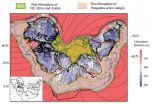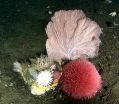Group calls for more transparency of experiments on primates
Thirty years after the US Congress enacted laws to promote the psychological well-being of primates in laboratories, the problem may be getting worse
2015-07-30
(Press-News.org) Washington -- Thousands of nonhuman primates continue to be confined alone in laboratories despite 30-year-old federal regulations and guidelines mandating that social housing of primates should be the default. A new article co-authored by PETA scientists and Marymount University researchers, published in Perspectives in Laboratory Animal Science, argues that many laboratories cage primates alone--a harmful practice often done for convenience--and that the U.S. government isn't doing enough to address this growing problem.
Decades of research shows that housing highly intelligent, social primates alone causes them extensive psychological and physical harm. As many as 89 percent of singly housed monkeys exhibit abnormal, stress-induced behavior, including incessant pacing, rocking, hair-pulling, and even self-biting. They also suffer from higher incidence of physical ailments such as heart disease. Yet studies show that the number of singly housed primates in the U.S. may be increasing.
Researchers from People for the Ethical Treatment of Animals' (PETA) Laboratory Investigations Department and the Departments of Psychology and Sociology at Marymount University reviewed existing data as well as public documents submitted by laboratories to the U.S. Department of Agriculture (USDA) from 2010 to 2013, in which the number of primates singly housed for experimental reasons and the scientific justifications for the Animal Welfare Act exemption were reported.
The researchers found the following significant results:
The total number of facilities that confined primates stayed relatively flat over the four years.
There was a steady increase in the number of facilities that reported singly housing primates, from 30 (16 percent) in 2010 to 53 (29 percent) in 2013.
From 2010 to 2013, the percentage of laboratories reporting singly housed primates that failed to adequately report and justify the single housing of primates--which is required by law--increased from 36 percent to 47 percent. In addition, some or all of the required information was improperly redacted from many facilities' reports.
Troublingly, in apparent response to the researchers' attempts to reconcile this missing information and their concerns about the inadequacy of the facilities' reports, the USDA has now directed laboratories to stop reporting this information altogether, completely shutting off any public access to this information.
"The scientific evidence that primates suffer psychologically and physiologically as a result of being caged alone is overwhelming," says study co-author Justin Goodman, a director at PETA and an adjunct instructor of sociology at Marymount University in Arlington, Virginia. "The USDA's recent revisions to reporting requirements will limit the availability of data and, consequently, stifle informed debate on the suffering of primates in laboratories and failures of the existing regulatory system. To address this issue meaningfully, we need more transparency and accountability, not less."
The article, published in Perspectives in Laboratory Animal Science, can be found here.
INFORMATION:
ELSE PRESS RELEASES FROM THIS DATE:
2015-07-30
Boulder, Colo., USA - Two hundred and fifty million years ago, all the major continents were joined together, forming a continent called Pangea (which means "all land" in Greek). The plate thickness of continents can now be measured using seismology, and it is surprisingly variable, from about 90 km beneath places like California or Western Europe, to more than 200 km beneath the older interiors of the U.S., Eastern Europe, and Russia.
Authors Dan McKenzie, Michael C. Daly, and Keith Priestley wondered what the pattern of plate thickness looked like before Pangea broke ...
2015-07-30
190 million Americans share the luxuries of human life with their pets. Giving dogs and cats a place in human homes, beds and--sometimes even, their wills--comes with the family member package.
Amongst these shared human-pet comforts is the unique luxury to overeat. As a result, the most common form of malnutrition for Americans and their companion animals results not from the underconsumption, but the overconsumption of food. The obesity epidemic also causes a similar array of diseases in people and pets: diabetes, hyperlipidemia and cancer.
During this year's ADSA-ASAS ...
2015-07-30
Do you ever notice how stress and mental frustration can affect your physical abilities? When you are worried about something at work, do you find yourself more exhausted at the end of the day? This phenomenon is a result of the activation of a specific area of the brain when we attempt to participate in both physical and mental tasks simultaneously.
Ranjana Mehta, Ph.D., assistant professor at the Texas A&M Health Science Center School of Public Health, conducted a study evaluating the interaction between physical and mental fatigue and brain behavior.
The study showed ...
2015-07-30
North of the Aleutian Islands, submarine canyons in the cold waters of the eastern Bering Sea contain a highly productive "green belt" that is home to deep-water corals as well as a plethora of fish and marine mammals.
Situated along the continental slope, the area also supports a thriving -- but potentially environmentally damaging -- bottom-trawling fishing industry that uses large weighted nets dragged across the seafloor to scoop up everything in their path.
A new study, conducted by research biologist Robert Miller of UC Santa Barbara's Marine Science Institute ...
2015-07-30
CAMBRIDGE, Mass--Two key physical phenomena take place at the surfaces of materials: catalysis and wetting. A catalyst enhances the rate of chemical reactions; wetting refers to how liquids spread across a surface.
Now researchers at MIT and other institutions have found that these two processes, which had been considered unrelated, are in fact closely linked. The discovery could make it easier to find new catalysts for particular applications, among other potential benefits.
"What's really exciting is that we've been able to connect atomic-level interactions of water ...
2015-07-30
A team of scientists has linked changes in the structure of a handful of central brain neurons to understanding how animals adjust to changing seasons. Its findings enhance our understanding of the mechanisms vital to the regulation of our circadian system, or internal clock.
The work, which appears in the journal Cell, focuses on the regulation of "neuronal plasticity"--changes in neuronal structure--and its function in the brain.
"Neuronal plasticity underpins learning and memory, but it is very challenging to tie changes in specific neurons to alterations in animal ...
2015-07-30
Despite their remarkably similar appearance, the "golden jackals" of East Africa and Eurasia are actually two entirely different species. The discovery, based on DNA evidence and reported in the Cell Press journal Current Biology on July 30, increases the overall biodiversity of the Canidae--the group including dogs, wolves, foxes, and jackals--from 35 living species to 36.
"This represents the first discovery of a 'new' canid species in Africa in over 150 years," says Klaus-Peter Koepfli of the Smithsonian Conservation Biology Institute in Washington, DC.
The new study, ...
2015-07-30
The desire to quit smoking--often considered a requirement for enrolling in treatment programs--is not always necessary to reduce cigarette cravings, argues a review of addiction research published July 30 in Trends in Cognitive Sciences. Early evidence suggests that exercises aimed at increasing self-control, such as mindfulness meditation, can decrease the unconscious influences that motivate a person to smoke.
Scientists are looking to the brain to understand why setting a "quit day" isn't a surefire way to rid oneself of a cigarette habit. Recent neuroimaging studies ...
2015-07-30
A study that took a novel approach to investigating factors affecting the emergence of symptoms of Huntington's disease (HD) has identified at least two genome sites that house variants that can hasten or delay symptom onset. In their report in the July 30 issue of Cell, the multi-institutional research team describes how genome-wide association analysis of samples from more than 4,000 HD patients found that particular variants on two chromosomes were more common in individuals who first exhibited HD-associated movement disorders either earlier or later than would otherwise ...
2015-07-30
Not every mom and dad agree on how their offspring should behave. But in genetics as in life, parenting is about knowing when your voice needs to be heard, and the best ways of doing so. Typically, compromise reigns, and one copy of each gene is inherited from each parent so that the two contribute equally to the traits who make us who we are. Occasionally, a mechanism called genomic imprinting, first described 30 years ago, allows just one parent to be heard by completely silencing the other.
Now, researchers at the University of Utah School of Medicine report on a ...
LAST 30 PRESS RELEASES:
[Press-News.org] Group calls for more transparency of experiments on primates
Thirty years after the US Congress enacted laws to promote the psychological well-being of primates in laboratories, the problem may be getting worse



